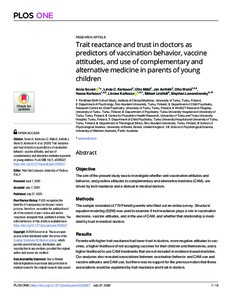Trait reactance and trust in doctors as predictors of vaccination behavior, vaccine attitudes, and use of complementary and alternative medicine in parents of young children
Karlsson Linnea; Waris Otto; Mäki Otto; Lindfelt Mikael; Karlsson Linda C.; Antfolk Jan; Karlsson Hasse; Lewandowsky Stephan; Soveri Anna
https://urn.fi/URN:NBN:fi-fe2021042821619
Tiivistelmä
Objective: The aim of the present study was to investigate
whether anti-vaccination attitudes and behavior, and positive attitudes to
complementary and alternative medicine (CAM), are driven by trait reactance and
a distrust in medical doctors.
Methods: The sample consisted of 770 Finnish parents who
filled out an online survey. Structural equation modeling (SEM) was used to
examine if trait reactance plays a role in vaccination decisions, vaccine
attitudes, and in the use of CAM, and whether that relationship is mediated by
trust in medical doctors.
Results: Parents with higher trait reactance had
lower trust in doctors, more negative attitudes to vaccines, a higher
likelihood of not accepting vaccines for their children and themselves, and a
higher likelihood to use CAM treatments that are not included in evidence-based
medicine. Our analyses also revealed associations between vaccination behavior
and CAM use and vaccine attitudes and CAM use, but there was no support for the
previous notion that these associations would be explained by trait reactance
and trust in doctors.
Conclusions: Taken together, higher trait reactance seems to be relevant for attitudes
and behaviors that go against conventional medicine, because trait reactance is
connected to a distrust in medical doctors. Our
findings also suggest that high trait reactance and low trust in doctors function
differently for different people: For some individuals they might be associated
with anti-vaccination attitudes and behavior, while for others they might be related
to CAM use. We speculate that this is because people differ in what is
important to them, leading them to react against different aspects of
conventional medicine.
Kokoelmat
- Rinnakkaistallenteet [19207]
